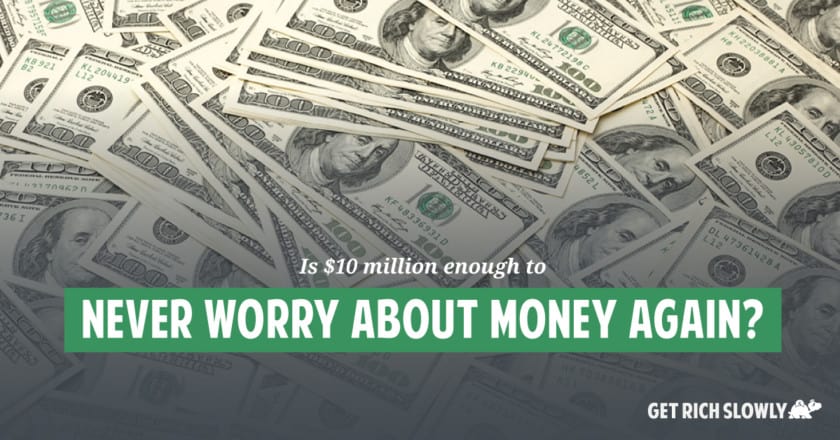Is $10 million enough to never worry about money again?

When people send me email, they usually have very specific questions about their very specific circumstances. "What should I do about my ailing parents?" "Should I fund my kids' college first or put money aside for retirement?" "How should I save for a down payment?"
Recently, though, a Money Boss reader named Mark sent me a simple hypothetical question. Here's the entirety of his email:
If you had $10,000,000 (in cash) at the age of 60, would you say that you would never have to worry about money again?
702(j) retirement plan: What is a 7702 retirement account?

Most people hate to pay taxes. That's not hard to understand. What is baffling is the lengths people will go to avoid taxes - sometimes, the cost of avoiding taxes exceeds the taxes themselves.
The reason this happens is that for some people, all they have to hear is that a scheme will help them avoid taxes, and they are on board. Remember though, avoiding taxes should not be your ultimate goal. The idea is to earn the best after-tax return. That means avoiding taxes is only worthwhile if the cost and risk involved don't diminish your investment return too much.
How many jobs is too many jobs?
As I write this, I am on vacation. And I'm not just working for GRS while on my break. I'm posting on social media for six other clients, and writing freelance pieces for two other websites.
So when I say I am on vacation, I really mean that I am working in a house that is not my own, with a lovely view of a beach. Since being laid off from my traditional full time job three years ago, I have fashioned a working life that involves working for multiple entities, doing multiple tasks.
Staying Afloat When Prospects are Slim
My most stable employer provides 25 hours a week (but it's also the lowest paying). The rest range anywhere from 3 to 10 hours a week, depending on what's happening and what's needed. Some of the work is seasonal. Some clients pop up for a few hours' work and then disappear for months.
Elder Financial Abuse: Signs, Symptoms and Preventive Measures
It's a form of abuse that often unfolds in silence. Its victims are often reluctant to report it. And it is likely to become even more commonplace as our society ages.

What is financial elder abuse?
Financial exploitation of elders occurs whenever someone dishonestly hijacks the resources of an older adult for personal gain, such as:
What is a bond? What you need to know about managing risk

Bonds can be great low-risk investments but chances are you have never purchased a bond ... and probably never will.
Same with me.
What’s the difference between retirement and financial independence?
I've spent a lot of time lately reading about retirement and Financial Independence over at Reddit. Reading other people's questions and comments helps get a feel for the sorts of challenges they face as they boost their saving rate and cut their spending in order to pursue bigger goals.
For those unfamiliar, Reddit is a large internet community with discussion boards dedicated to different topics. Though redditors would cringe at this characterization, in many ways it reminds me of America Online twenty years ago.
I like to browse forums (or "subreddits", as they're called) on subjects like:
How to Hire a Financial Planner (or Not)

Millions rely on financial professionals to do their investing for them but not everyone knows how to hire a financial planner the right way -- or when to say no to one.
On the surface, the rationale for hiring a financial planner or advisor seems valid. People feel intimidated by the whole investing thing. It seems like a jungle out there and, to boot, most people know someone who lost it all with bad investments. Others believe they just don't have enough time to learn about investing or to maintain their investments on an ongoing basis.
How to maximize returns while minimizing investment risk
Back in 2005, someone wrote that Priceline.com would be a good stock in which to invest. At the time, I used Priceline because I traveled frequently. I also knew of Peter Lynch's investing-for-success strategy, which boils down to buying stock in companies you do business with. I looked at the stock, which traded for around $20 to $25 at the time, thought about it … and passed. Was that smart?

Had I invested $1,000 back then, that investment would be worth about $55,000 today, just 10 years later. Priceline is but one of a hundred maximize-return stories you hear every day.
Not every investment is that good. I could also have invested the $1,000 in Yahoo at that time. That investment, however, would only be worth $850 today. The same investment in Bank of America would be worth less than $400 today. We call that risk. Continue reading...
Pay off student loans or invest — how to move toward funding retirement
In my recent post, "Why investing can be better than paying down debt," Dianecy's comment raised a question faced by many: What do you do about investing when you have student loans?
It is quite the dilemma, actually, because the best time to start funding your retirement is when you're still in your 20s. And as anyone who has been reading Get Rich Slowly for more than, say, 10 seconds would know, few things impede your progress toward getting rich (at any speed) like debt.
The reason is simple: A dollar can be spent only once -- either for another person's benefit or for yours. So it follows that repaying debt benefits the bank; investing those same dollars in a CD or index fund, on the other hand, benefits you and your future.
Starting to save for retirement at 40

There's something about reaching the big 4-0 that often causes you to re-evaluate your direction in life. And when you do, it's hard to escape the fact that your day of retirement is indeed approaching faster than you ever thought possible.
If you're one of those who eliminated debt and made investing for retirement a habit since your 20s, there's very little to do other than enjoy your 40th birthday and continue on with what you're doing. But if you're heading into your 40s having done nothing to prepare for retirement, the prospects can be downright scary.